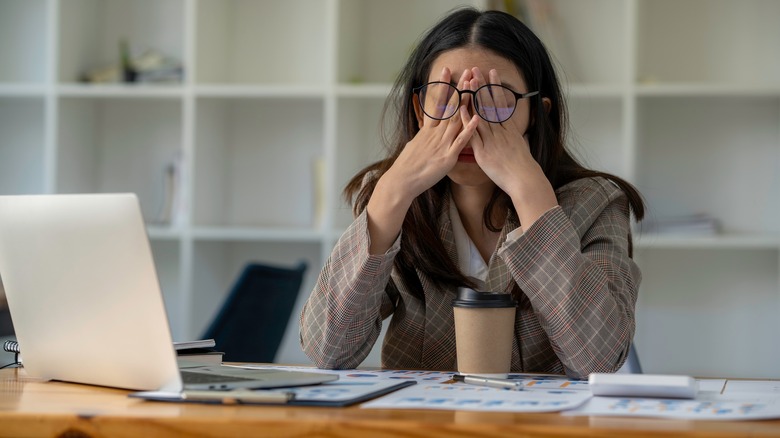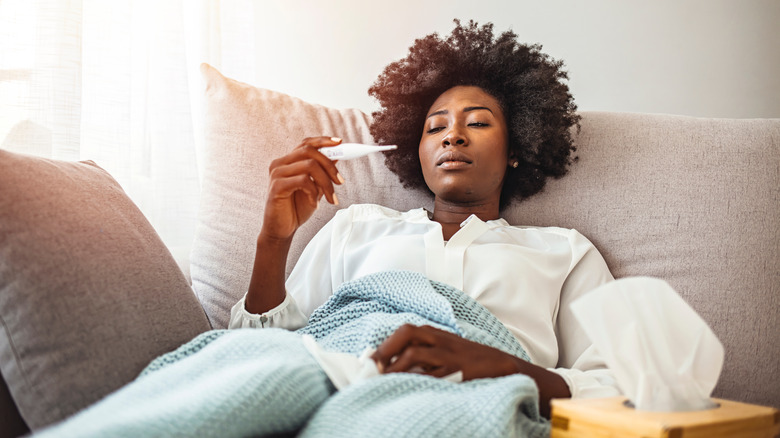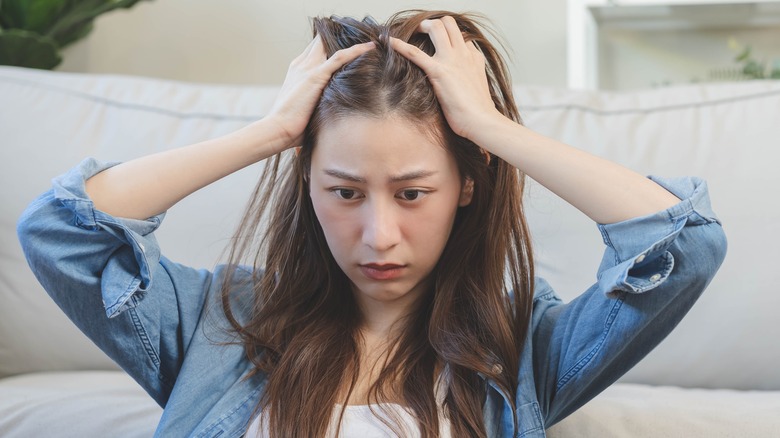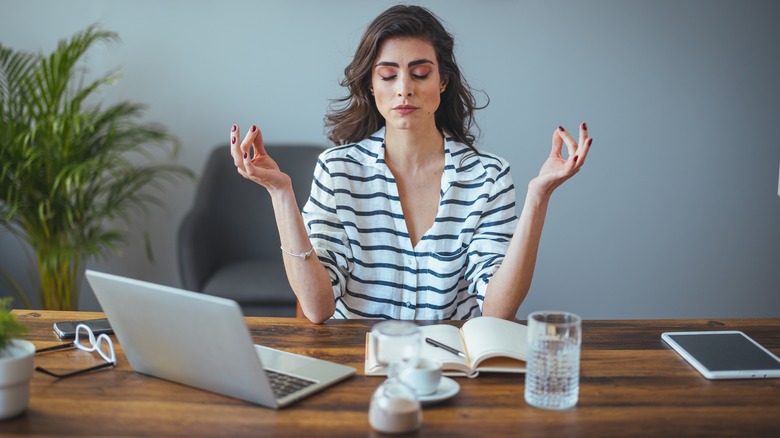What Happens To Your Body When You Don't Get Enough Relaxation
Inhale, exhale, and notice yourself ease into a state of relaxation. If that feeling is unfamiliar, you're not alone. Per the Daily Mail, a 2018 survey conducted by Healthspan revealed that around 75% of people rarely have a full day of downtime, and 46% struggle to relax during weekends and holidays. Relaxation can start to feel like a luxury, rather than a necessity, especially when hectic schedules take over.
However, viewing rest this way makes slowing down even less likely. F. Diane Barth, a licensed clinical social worker, wrote for Psychology Today about the discomfort many of us experience when we finally take time to rest. We might feel guilty or like we're failing in some way. She suggests treating relaxation as a skill worth mastering, rather than viewing it as a non-essential indulgence.
Finding the time and motivation to relax might not come easily if you're used to going, going, going. But understanding how putting rest on the back burner can affect your health might be the trigger you need to finally wind down. Here's what happens to your body when you adopt a toxic no-chill lifestyle — and how to start squeezing relaxation into your schedule.
You might experience more physical pain
Stress can be a pain — literally. When you don't find time to relax and your body is constantly in overdrive, you might experience more aches and pains. Chronic stress creates tension in the body, which can make muscles feel tight, especially in the upper body. "Stress can trigger tension headaches, tightness in the neck and jaw, and knots and spasms in your neck and shoulders," internal medicine physician Dr. Richard Lang told Cleveland Clinic. "It also may contribute to TMJ, a jaw disorder."
Additionally, you might notice more pain associated with conditions like arthritis and fibromyalgia when you don't relax enough. Aside from increasing muscle tension, stress changes the way your body responds to pain, according to a 2014 study published in the journal Pain. The study found that stressed individuals were worse at regulating pain signals. In other words, physical discomfort can feel more intense when you're constantly on alert.
You'll probably get sick more easily
When you don't rest, your immune system pays the price. Your body responds to stress by decreasing its number of infection-fighting white blood cells (per Cleveland Clinic). Add in an extra dose of the stress hormone cortisol, which revs up inflammation in the body, and you'll likely find yourself using up all your vacation days to stay home in bed.
"When people are stressed, they get sick. It could be a cold or cold sores, which pop up because the immune system can't suppress the virus," Dr. Shanna Levine, a primary care physician and clinical instructor of medicine, explained to Insider.
Even if you don't feel stressed, neglecting rest and relaxation can take a toll on your immunity. According to Mayo Clinic, a hustle lifestyle that hinges on sleep deprivation is more likely to result in infection and illness. In short, your body will make sure you get rest one way or another — even if it requires getting sick first.
Your mind might not be so sharp
When you pile on stress and hardly find a moment to relax, your brain begins to change. Premier Neurology & Wellness Center explains that chronic stress can cause the brain to produce too much white matter (the tissue that connects and sends messages between different areas of the brain), which can lead to irreversible physical changes. Perhaps even worse, constantly being in fight-or-flight mode can destroy brain cells and shrink certain areas of the mind responsible for emotions, memory, and other important functions. That's likely why long-term stress has been linked to dementia and Alzheimer's disease (per Harvard Health Publishing).
Relaxation, on the other hand, counteracts these changes to the brain, says Forbes. Taking a breather to meditate can help grow gray matter (keeping white matter in check), thicken parts of the brain associated with memory and emotion regulation, and improve focus. And these effects don't just last while you're sitting on your meditation mat — they continue for some time after your chill session is over.
You could develop heart disease
When you think of taking care of your heart, you may imagine cutting down on fast food or hitting the gym a few times a week. But these habits only go so far to protect your heart without relaxation.
According to the American Heart Association, stress fires up your heart rate and blood pressure to help you stay alert during emergency situations. But when stress lasts days or even weeks at a time, it can cause high blood pressure and eventually a heart attack or stroke.
Similar to the effects of constantly operating in stress mode, neglecting rest can jeopardize heart health. The Centers for Disease Control and Prevention suggests getting at least seven hours of sleep per night. Clocking fewer hours of shut-eye increases your risk of health problems that can affect the heart, such as high blood pressure, type 2 diabetes, and heart attack.
How to find space in your schedule to relax
Let's be honest: most of us want to relax, and the physical health benefits are the icing on the cake. Simply put, lounging around or doing a favorite hobby feels good. The only problem is many of us struggle to find time and space to let go of stress and fully unwind.
Thankfully, relaxation doesn't require a ton of free time. The experts at Healthline say it only takes five minutes here and there to chill out. They recommend quick activities like breathing exercises, journaling, and walking in nature to escape the daily grind.
It's also important to cherish the little bit of relaxation time you have, without letting distractions get in the way. "Six hours of half-assed relaxing is not as good as two hours of focused, intentional relaxing," Dr. Ryan Howes, a clinical psychologist, told Self. In other words, stop doomscrolling (something that can be harmful to your health in and of itself) and zero in on the activities that bring you the most joy.
Finally, don't discount the relaxing rituals that already exist in your daily life. Take slow, deep breaths while eating, for example, or start a little meditation practice in the shower. Your mind — and body — will thank you.





